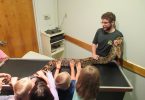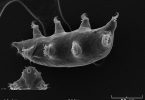Dr. Jennifer Clarke, Professor of Wildlife Biology
Professor of Wildlife Biology Dr. Jennifer Clarke has had a multitude of research papers published in several journals in recent years, from work on the barks and howls of dingoes to the vocalisations of captive Sumatran tigers, her most recently published work.
Three of Dr. Clarke’s recently published papers were the result of a project she supervised at the Department of Biological Sciences, Macquarie University, on Dingo vocal communication. Dr. Clarke and her team tested whether acoustic surveys could be an effective, alternative tool to current costly, invasive practices to monitor wild dingo populations. In her most recent paper, Dr. Clarke worked with colleagues from Macquarie University and the University of New South Wales in Australia to measure the acoustic characteristics of multiple, distinctly different tiger sounds and linked those sounds to behavioural contexts.
Dr. James T. Spartz, Assistant Professor of Environmental Communication
“YouTube, Social Norms and Perceived Salience of Climate Change in the American Mind,” a study by Assistant Professor of Environmental Communication Dr. James T. Spartz in the journal Environmental Communication, links the number of views listed under YouTube videos about climate change to perceptions of how “others” feel about the climate issue.
Participants in an experiment conducted with the help of colleagues at University of Wisconsin Madison and Marquette University were exposed to a YouTube video about climate change using two experimental conditions: one providing a small number of views under the video and the second listing a large number of views. Results suggest that the “number of views” influenced participant perceptions of the importance assigned by other Americans to the issue of climate change.
Dr. John Hopkins, Assistant Professor of Wildlife Biology
As climate change continues to alter the environment in Yellowstone National Park and its surrounding region, Unity College’s Dr. John Hopkins is studying impacts on the diets of the region’s iconic, threatened grizzly bears.
In “Selecting the best stable isotope mixing model to estimate grizzly bear diets in the Greater Yellowstone Ecosystem,” a study published May 11 in PLOS ONE, lead author Dr. Hopkins and his team found that whitebark pine seeds and other plant foods are more important than meat to grizzly bears sampled within the Greater Yellowstone Ecosystem, and they continued to forage for the seed despite the tree’s decline. No previous research had ever reliably estimated the contribution of whitebark pine seeds to the diets of grizzlies through time.






